 EACC deputy director of education and
awareness Emily Mworia [2nd L] and Matuga deputy county commissioner
Frida Kawira in Kwale on Monday / BRIAN OTIENO
EACC deputy director of education and
awareness Emily Mworia [2nd L] and Matuga deputy county commissioner
Frida Kawira in Kwale on Monday / BRIAN OTIENOThe Ethics and Anti-Corruption Commission has raised concern that most Kenyans either do not know their roles or feel too insignificant to influence the fight against corruption.
EACC deputy director of education and awareness Emily Mworia said empowering citizens with knowledge and responsibility is key to winning the war on the vice.
“A well-informed citizenry is key to winning the war against graft,” Mworia said on Monday in Kwale after meeting Matuga deputy county commissioner Frida Kawira.
She said the commission’s strategy now focuses on civic education and grassroots engagement through newly established Corruption Prevention Committees in counties.
The committees bring together public officers, youth groups—including boda boda operators—and local communities to enhance public participation in governance and anti-corruption efforts.
“This initiative makes people at the grassroots feel more involved and take ownership of the fight against corruption,” Mworia said, noting that civic education forums are ongoing across the country in partnership with counties.
Corruption continues to cripple public institutions and burden taxpayers, adding that prevention is the commission’s first line of defence.
Special focus, she said, is being placed on empowering the youth, who make up about 75 per cent of Kenya’s population.
“If we succeed in shaping their mindset early, we will have taken a major step toward building a corruption-free generation,” she said.
“There is no difference between the person who gives a bribe and the one who takes it—they are both part of the problem.”
The deputy commissioner lauded the new approach, saying it shifts the focus from enforcement to education and collective responsibility.
“Many people, both knowingly and unknowingly, have been promoting corruption out of ignorance. This programme helps the public understand the forms of corruption and how they contribute to it,” Kawira said.
She added that the government’s embrace of digital transactions through the e-Citizen platform aims to enhance transparency, reduce cash handling and curb corruption in public service delivery.



















